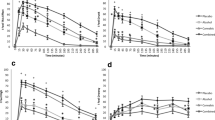Abstract.
Rationale: Many previous studies have reported that alcohol and cannabis produce additive psychomotor effects in acute combination, but few have explicitly tested whether chronic exposure to cannabis, in the absence of acute administration, alters the effects of alcohol on psychomotor performance. Objectives: To test whether long-term cannabis use modulates the effects of alcohol on psychomotor skills and self-reported mood and sensation. Methods: Regular cannabis users (minimum: daily use for at least 3 years) and infrequent users (maximum: once-monthly use for at most 3 years) were matched for sex, age, alcohol intake and other drug use (14 participants in each group). Participants received alcohol (females 0.35 g/kg; males 0.45 g/kg) and placebo drinks. By urinalysis, only regular users tested positive for metabolites of Δ9-tetrahydrocannabinol; breath alcohol levels were similar between groups. Participants were tested on a computerised tracking task that has been used to screen drugs for adverse effects on driving. The task involved tracking a moving target on a computer screen while simultaneously responding to occasional presentations of stimuli in the periphery of the screen. Results: Tracking accuracy was similar for both groups after placebo, but alcohol caused a significant deterioration in performance among infrequent cannabis users relative to regular users. These changes were mirrored by significant changes in self-reported scores for dizziness, measured by visual analogue scales. Alcohol slowed reaction times, but not differentially between groups. Conclusions: For psychomotor skills relevant to driving, chronic cannabis use (in the absence of acute administration) does not potentiate the effects of alcohol. In fact, the superior tracking accuracy of regular users relative to infrequent users after alcohol, and their lower scores for dizziness, suggest that chronic cannabis use may instead confer cross-tolerance to specific effects of alcohol on behaviour.
Similar content being viewed by others
Author information
Authors and Affiliations
Additional information
Electronic Publication
Rights and permissions
About this article
Cite this article
Wright, .K., Terry, .P. Modulation of the effects of alcohol on driving-related psychomotor skills by chronic exposure to cannabis. Psychopharmacology 160, 213–219 (2002). https://doi.org/10.1007/s00213-001-0955-4
Received:
Accepted:
Issue Date:
DOI: https://doi.org/10.1007/s00213-001-0955-4




